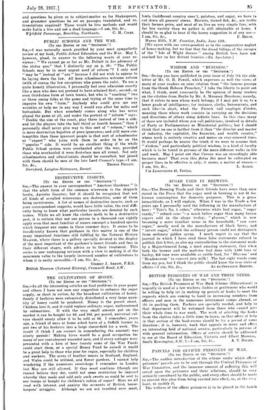PUBLIC SCHOOLS AND THE WAR.
(To THE Emma or Tux "Sem-rove.")
Sis,—I was naturally much gratifled by your most sympathetic review of my book. Public School Education and the War. May I. however, plead, in answer to the following words of your re- viewer : "We cannot go so far as Mr. Pellatt in his advocacy of the status guo," that I distinctly say on p. 60: "The Public Schools may be in most urgent need of reform "? I only said "may be" instead of "ore" because I did not wish to appear to be laying down the law. All keen schoolmasters welcome reform (with of course the few exceptions who prove the rule). To use a quite homely illustration. I personally feel over education exactly like a man who does not pretend to have attained first-, second-, or even third-class form at lawn tennis, but who is "coaching" two or three young folks at the game and trying at the same time to improve his own "form." Anybody who could give me any wrinkles or help me in any way I would run after for miles and buttonhole. But when somebody comes along who has never played the game at all, and under the pretext of "reform " says "Double the sine of the court, play three instead of two a side, and let the players take the ball third or fourth bounce." then I personally shall never give way to this sort of "reform." which IS mere destruction begotten of pure ignorance; and still more con- temptible than these ignorant people is that sort of schoolmaster or "expert" who joins with them in order to be on the " popular" side. It would be an excellent thing if the whole Public School system were overhauled after the war, provided those who overhauled it were first-class men all round. Not only schoolmasters and educationists should be consulted; but joined with them should be men of the late Lord Cromer's type.—! am,


































 Previous page
Previous page